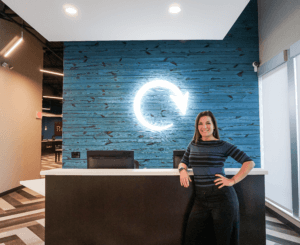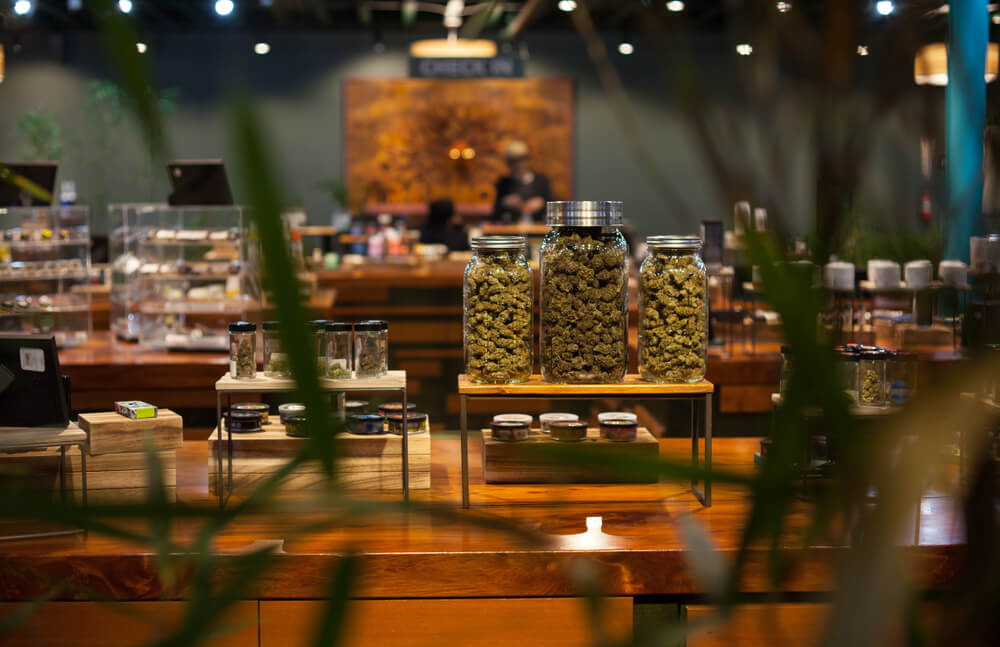by Christina Casile, Owner of Design 710
As the legalization of cannabis spreads rapidly throughout the United States and across the globe, new medical and adult-use dispensaries are opening just about every day. The progression of architecture and design within dispensaries has expanded just as quickly as the legalization of their products.
The saying, “never judge a book by its cover,” has been ingrained into our brains since our adolescence. The truth is, consumers are first drawn to a product or location simply by the look of it. That is why your space must stand out from your competitors. From choosing the right location to conceptualizing layouts, here are a few major mistakes to avoid when designing a dispensary.
Layout
The foundation of any dispensary design should be rooted in the customer experience. A poor layout can interfere with traffic flow, lead to security issues, and cause longer wait times, which upsets patients. The goal is to create an effective layout that provides efficiency for patients while encouraging them to spend more time in the store, discussing products and treatments.
To achieve this goal, designers must have a deep understanding of how a “typical” customer will move within space and in what order. Mastering that concept allows designers to make the best use of the available space.
Basic Interior Design Features
 A dispensary does not have to be a cold, sterile environment; in fact, it shouldn’t be! New patients may already be intimidated; bright and welcoming furnishings and color palettes will contribute significantly to their experience. Additionally, an inviting design will help attract and retain patients.
A dispensary does not have to be a cold, sterile environment; in fact, it shouldn’t be! New patients may already be intimidated; bright and welcoming furnishings and color palettes will contribute significantly to their experience. Additionally, an inviting design will help attract and retain patients.
Interior design can quickly become mismatched and overdone. To avoid your design and layout, looking discombobulated, stick to a style, and keep in mind that less is more. Adhering to an overall aesthetic will ensure your elements flow together and complement one another.
Another major factor contributing to the layout and function of a dispensary is the merchandise display. For starters, all of the displays should be made of the same materials. Whether it be wood or glass, keep it consistent.
Now, think about the customer experience. Products layered in vertical displays tend to make browsing the selection easier than a flat surface.
Finally, make sure you build out the appropriate amount of displays. Too much space and the dispensary will look like it’s lacking while not enough space will leave it looking cluttered.
Furniture Selection
To you, the words cheap and inexpensive may be synonymous, but to an interior designer, something defined as “cheap” implies that it is poorly made and, therefore, of low quality. With that said, avoid purchasing cheap furnishings. Opening a retail cannabis location is a costly feat. So, it’s understandable that you would want to cut costs where you can. Know that cheap furniture and furnishings can tarnish a customer’s experience as well as your dispensary’s reputation. Most importantly, buying cheap seating and tables from budget vendors that are not for commercial use can lead to unexpected claims.
Dispensaries follow the same rules as retail stores
As a store-front business, foot traffic will be consistent. Failing to prepare for the long-term wear and tear of your floors, couches, and tables, etc., can be costly.
Practicality is essential here. Select flooring and surfaces that require minimal maintenance and won’t show visible signs of deterioration. The furniture should be durable enough to last and comfortable enough to function well for all ages and abilities.
Lastly, remember that the design of a retail store does not change from year-to-year, if ever. Create a timeless design.
Location
Location is one of the most important elements that factor into the success of any retail business. Prime locations support long-term success.
Unfortunately, prospective dispensary owners can not pick any old retail space they want. Due to rigid state laws and local regulations, they are limited in terms of available real estate. Familiarizing yourself with an area’s zoning laws is critical for establishing your business in the best possible location.
ATMs
Given the current status of the banking laws within the cannabis industry, the majority of purchases still need to be made with cash. Do not overlook an ATM when conceptualizing the layout! If there is nowhere for a patient to withdraw the cash necessary for a purchase, owners are missing out on sales.
If your budget allows, offer cashless ATM services to enable quick and safe transactions, which not only makes purchasing more convenient for customers but also adds to the security of your dispensary by limiting the accumulation of cash.
Perpetuating Old Stereotypes
The modern-day cannabis consumer represents a cross-section of the diverse population. Creating an environment that plays into the negative stereotypes will turn off a good portion of consumers simply because they will not want to be associated with the old stigmas surrounding marijuana. Paying homage to Jeff Spicoli will not only offend a majority of potential customers, but it will also draw unwanted attention from the surrounding community and law enforcement.
 Christina is a certified Interior Designer with 20+ years of experience in the industry. Chris received a Bachelor of Science in Interior Design from Philadelphia University and honed her skills as an interior designer with several large architecture firms in Philadelphia. Specifically, while with Ballinger and EwingCole, Chris gained considerable experience in a variety of market sectors including healthcare, research and development, government, education and sports and entertainment, overseeing dozens of multi-million dollar projects. Christina first established herself in the cannabis industry when she was recruited to join a team of experts assembled by Philadelphia-based attorneys and consultants Moriconi Flowers, Ltd. to assist clients in obtaining permits to grow, process, and sell marijuana. Moriconi Flowers intended to coordinate a group of diverse professionals to act as strategic partners to support marijuana permit application projects and identified Christina and Design 710 as ideal to provide building/zoning code analysis, budget and schedule development, and interior design services to their clients. Christina quickly became an integral part of the team.
Christina is a certified Interior Designer with 20+ years of experience in the industry. Chris received a Bachelor of Science in Interior Design from Philadelphia University and honed her skills as an interior designer with several large architecture firms in Philadelphia. Specifically, while with Ballinger and EwingCole, Chris gained considerable experience in a variety of market sectors including healthcare, research and development, government, education and sports and entertainment, overseeing dozens of multi-million dollar projects. Christina first established herself in the cannabis industry when she was recruited to join a team of experts assembled by Philadelphia-based attorneys and consultants Moriconi Flowers, Ltd. to assist clients in obtaining permits to grow, process, and sell marijuana. Moriconi Flowers intended to coordinate a group of diverse professionals to act as strategic partners to support marijuana permit application projects and identified Christina and Design 710 as ideal to provide building/zoning code analysis, budget and schedule development, and interior design services to their clients. Christina quickly became an integral part of the team.
Design 710’s successes have included designing the project for the winning application and first dispensary to open in Philadelphia, designing the project for a winning grower/processor applicant in the Delaware Valley, and designing the winning project for an additional marijuana dispensary permit holder in the Philadelphia area.
Design 710 was created to help assist both new and experienced businesses to navigate the ever-changing cannabis industry. Christina’s intuition and experience has made her the ideal interior designer for countless projects, including 3 dispensaries she opened with Restore Integrative Wellness Center in the greater Philadelphia area over the last 2 years. Christina’s experience working within the recreational and medical cannabis industry makes her an excellent strategic partner, and her unique vision is complemented by years of experience navigating the ins and outs of opening a dispensary. Having provided design assistance and consultation to projects in Pennsylvania, New Jersey, Ohio, Connecticut, Massachusetts, and Missouri, Christina has a wealth of experience navigating multiple markets.


Follow NCIA
Newsletter
Facebook
Twitter
LinkedIn
Instagram
–